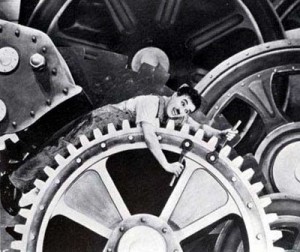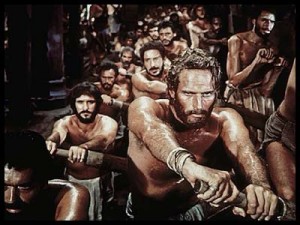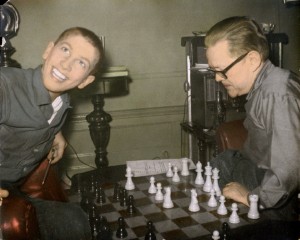Did I mention the part about the woman jumping and the goat jumping? (Thanks Reddit.)
You are currently browsing the yearly archive for 2011.
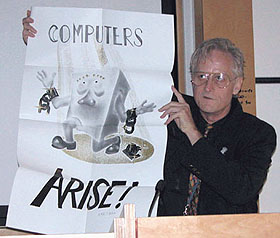
"Most people are fools, most authority is malignant, God does not exist, and everything is wrong." (Image by Tim Brailsford.)
To dream big is to risk failing big, and nobody in the computer world dreamed bigger than visionary Ted Nelson. The information pioneer and philosopher coined the term “hypertext” in 1963 and spent the majority of his life frustratingly, unsuccessfully working on Project Xanadu, a system that attempted to link networked computers with a simple interface decades before the invention of the World Wide Web. Nelson’s tilting at virtual windmills was the subject of a devastating Wired article in 1995 by Gary Wolf. An excerpt:
“Nelson’s life is so full of unfinished projects that it might fairly be said to be built from them, much as lace is built from holes or Philip Johnson’s glass house from windows. He has written an unfinished autobiography and produced an unfinished film. His houseboat in the San Francisco Bay is full of incomplete notes and unsigned letters. He founded a video-editing business, but has not yet seen it through to profitability. He has been at work on an overarching philosophy of everything called General Schematics, but the text remains in thousands of pieces, scattered on sheets of paper, file cards, and sticky notes.

The Hypertext Editing System (HES), seen here being used at Brown University in 1969, was developed by Ted Nelson and others. (Image by Greg Lloyd.)
All the children of Nelson’s imagination do not have equal stature. Each is derived from the one, great, unfinished project for which he has finally achieved the fame he has pursued since his boyhood. During one of our many conversations, Nelson explained that he never succeeded as a filmmaker or businessman because ‘the first step to anything I ever wanted to do was Xanadu.’
Xanadu, a global hypertext publishing system, is the longest-running vaporware story in the history of the computer industry. It has been in development for more than 30 years. This long gestation period may not put it in the same category as the Great Wall of China, which was under construction for most of the 16th century and still failed to foil invaders, but, given the relative youth of commercial computing, Xanadu has set a record of futility that will be difficult for other companies to surpass. The fact that Nelson has had only since about 1960 to build his reputation as the king of unsuccessful software development makes Xanadu interesting for another reason: the project’s failure (or, viewed more optimistically, its long-delayed success) coincides almost exactly with the birth of hacker culture. Xanadu’s manic and highly publicized swerves from triumph to bankruptcy show a side of hackerdom that is as important, perhaps, as tales of billion-dollar companies born in garages.”
Tags: Gary Wolf, Ted Nelson

"The blowgun was demonstrated by one of the natives to my parents by darting a monkey out of a tree from a great distance."
Vintage Amazon Blowgun – $200 (Shelton, CT)
Vintage Amazon Blowgun from the seventies. This is not a tourist item. It includes the 72” gun, a woven sack that holds the kapok cotton for the end of the dart, the quiver that holds the darts and a Piranha jaw bone to sharpen the darts.
Here is the truth, the whole truth! My parents were adventurous travelers when they where younger. In the mid seventies they made a trip to South America. While in Brazil, they took a trip up the Amazon River as far as their group could go. But that wasn’t good enough for them and they decided to go further up the river against local recommendations. They found transportation and ventured onward. A day or two later, they came across a tribe and befriended them and stayed with them for a couple days. The Blowgun was demonstrated by one of the natives to my parents by darting a monkey out of a tree from a great distance. My mother had to have this Blowgun, so she traded her sneakers for it! That’s THE END of the story!
No hands, just brains. (Thanks IEEE Spectrum.)
Parents in nineteenth-century New York City who had their hands full with their wild, waifish children sometimes requested assistance from the House of Refuge, which was the first juvenile reformatory in the country, with roots going back to 1816. The following brief notices from the Brooklyn Daily Eagle concern incorrigible children who did a stint at the institution.
••••••••••
“Wayward Rose Herman” (March 1, 1898): “Thirteen year old Rose Herman of 131 Central avenue was committed to the House of Refuge this morning by Magistrate Worth in the Gates avenue court. Mrs. Mary Herman, the girl’s mother, appeared against her and told the magistrate that Rose sought disorderly companions, stayed out late at night and would not heed her mother’s good advice. Some time ago Rose was arrested on a similar complaint and was sent to the Training School. When she came out she continued her waywardness until her mother was forced to appeal to the Children’s Society. Agent Sauer took the girl away.
Rose is a pretty girl and tall for her age. She showed a defiant manner in court and though her mother’s eyes were filled with tears at the parting, the girl was not at all affected and scarcely noticed her mother.”
••••••••••
“Sent Joseph to the House of Refuge” (May 11, 1895): “Joseph Hoffman of 179 Stuyvesant avenue is only 13 years old, but his mother cannot manage him. Yesterday afternoon he beat her over the head with a fire shovel and she had him arrested. In the Gates avenue police court this morning Judge Harriman committed Joseph to the Hose of Refuge.
••••••••••

"Maria Delisso, an Italian girl 14 years old, was sent to the House of Refuge by Justice Walsh this morning on a charge of having been a disobedient and vicious child." (Image by Lewis Hine.)
“Maria Was a Bad Girl” (December 19, 1896): Maria Delisso, an Italian girl 14 years old, was sent to the House of Refuge by Justice Walsh this morning on a charge of having been a disobedient and vicious child. The complainant was the girl’s father, who lives at 821 Kent avenue. Maria left home last August, and for two months her father searched for her and finally found her at a low Italian resort on Mott street, New York. Nicolo Scardino, with whom she was living there, has been sent to the Elmira reformatory by authorities of New York City. Roundsman Vacbris of the headquarters squad arrested the girl in the Mott street house.”
••••••••••
“Committed for a Year” (December 1, 1877): “Justice Elliott this morning committed John J. White, a lad aged 16 years, to the House of Refuge for one year, on the complaint of the mother who resides at No. 294 North Second street. She charged him with stealing her Bible valued at three dollars.”
Tags: Agent Sauer, Henry Armstrong, Hyman Goldstein, John J. White, John McKeon, Joseph Hoffman, Judge Harriman, Justice Elliott, Justice Walsh, Magistrate Kramer, Maria Delisso, Mrs. Mary Herman, Nicolo Scardino, Police Officer Hagen, Rose Herman, Roundsman Vacbris, v
Take note, Michael Lohan. This is how it’s done.
From Alex Hoban and Henry Langston’s Vice article about Transnistria, an independent if unrecognized strip of the former Soviet Union which remains a pre-Glasnost gulag:
“Out on the fringes of the former USSR, in one little pocket of Eastern Europe, the trauma of the Soviet Empire’s collapse has never quite been shaken off. Since 1990 a little-known strip of land between Ukraine and Moldova has encased itself in an isolated world where Lenin still looms large. It has its own border control, passports, currency and everything else you normally need to be a real country – including a population that’s double the size of Iceland’s. Its Soviet credentials are impeccable: It’s being run as a corrupt leader-cult led by an elite of weapons smuggling crooks who’ll sooner gut your face than quote Marx. Yet its sovereignty is recognised by no-one and therefore, it isn’t a real country. Its name is Transnistria, but in the eyes of the world, it simply isn’t there.”
Tags: Alex Hoban, Henry Langston
A really strange artifact from 1975, this 30-minute documentary directed by Theo Kamecke and adapted from the book of the same name attempts to make Libertarianism sexy. The film’s writers (who appear onscreen as themselves) are six young, long-haired, hip proponents of the philosophy whose very presence sends the message that youth culture and free markets are not mutually exclusive. An incredible oversimplification of complex political and economic issues, the film contains the type of jaw-dropping anti-government propaganda that would give Ayn Rand a huge boner. But it’s still an odd and interesting remnant.
Tags: Ayn Rand, Theo Kamecke
LADIES? Are you married to a lowlife cheating pig? – $10000 (Midtown East)
Well, don’t get angry, GET EVEN!!!
If that bum has been cheating behind your back, using you and now found another girlfriend, it about time your teach him a lesson. Imagine, that pig tells you he loves you, while he screws his G/F behind your back! Outrageous!
It’s legal and it’s easy: If you have any of his cars registered on your name, I will buy them and pay you a fair price cash and will be very discreet about it. Your SOB hubby or B/f will learn a lesson he is not soon to forget.
You only need a title with your name on it and we can do this deal. You get the money, he loses his car and he’s screwed for a change…what could be more perfect?
Get back to me with all the info and we can get the ball rolling, you’re not going to be sorry as were nice people to do business with and your hubby deserves this.
Thank You!
Vinnie and Sal
Tags: Conan O'Brien

Mark Vaccacio portrayed John Lennon in the original run of "Beatlemaniaa" at the Winter Garden Theatre.
Veteran Bronx Beatles impersonator Mark Vaccacio continues performing, and taking his mind off of his illness, as he slowly dies from terminal cancer. From Michael Wilson’s story about Vaccacio in the New York Times:
“For more than three decades, Mr. Vaccacio has switched his accent from Bronx offstage to Liverpool on, starting with the role of John Lennon in Beatlemania on Broadway in the late 1970s. Since the late 1990s, he has played with the tribute band Strawberry Fields at clubs, summer festivals, corporate parties, black-tie weddings, Caribbean bars and, for several years, at noon every Saturday at B. B. King’s.
But without the suit and wig and teeth, he is just another guy from Yonkers by way of Long Island, with two ex-wives, more ex-girlfriends, a daughter far lovelier than he, a father who died young of colon cancer, and a bunch of pals in bands.
A guy who, about a year ago, suddenly had no appetite and went to the doctor. ‘I had a tumor the size of a softball on this side and a tumor the size of a golf ball here,’ Mr. Vaccacio recalled, patting his flat lower belly. He felt no pain then, except to his pride: he should have known better.”
Tags: Mark Vaccacio, Michael Wilson
Bicycle sold separately. (Thanks Reddit.)
This classic photograph was taken in the aftermath of a horrific 1894 fire that reduced to rubble St. George’s Church in Astoria, New York, which was at the time the oldest Episcopalian church in the city. It wasn’t an act of arson, but it was still devastating to the parishioners. An excerpt from coverage of the fire in January 11, 1894 New York Times:
“St. George’s Protestant Episcopal Church, in the Astoria section of this city, was totally destroyed by fire this morning. The parish record and the silver service were saved.
St. George’s Church was the oldest of the Episcopal denomination in this city. It was a frame structure, and stood on high ground on the corner of Main and Woolsey Streets. It was surrounded by a spacious churchyard, containing the vaults and graves of members of the oldest families.
When the firemen arrived, the flames had obtained so much headway that it was impossible to save the structure. The rectory stood within fifty feet of the burning church. The rector, the Rev. Charles E. Belden, had everything ready for immediate removal if necessary, but the flames did not reach the building.
Funeral services were to have been held in the church this morning, and in order to have the edifice comfortably heated the sexton built a fire in the furnace last night. It is believed the furnace overheated and set fire to the woodwork. The destroyed church contained a number of marble tablets erected to the memory of some of the oldest members of the congregation and several former rectors.”
Tags: Rev. Charles E. Belden
Computer scientist Bill Joy despised the violence of the Unabomber as any sane person would, so he felt great disquiet when he read a passage written by Ted Kaczynski and agreed with the domestic terrorist’s concerns for the future of humankind. In his famous 2000 Wired article, “Why the Future Doesn’t Need Us,” Joy meditates on the unease caused by his sympathies for the ideas of a madman. An excerpt:
“Part of the answer certainly lies in our attitude toward the new – in our bias toward instant familiarity and unquestioning acceptance. Accustomed to living with almost routine scientific breakthroughs, we have yet to come to terms with the fact that the most compelling 21st-century technologies – robotics, genetic engineering, and nanotechnology – pose a different threat than the technologies that have come before. Specifically, robots, engineered organisms, and nanobots share a dangerous amplifying factor: They can self-replicate. A bomb is blown up only once – but one bot can become many, and quickly get out of control.
Much of my work over the past 25 years has been on computer networking, where the sending and receiving of messages creates the opportunity for out-of-control replication. But while replication in a computer or a computer network can be a nuisance, at worst it disables a machine or takes down a network or network service. Uncontrolled self-replication in these newer technologies runs a much greater risk: a risk of substantial damage in the physical world.”
Tags: Bill Joy, Ted Kaczynski
The late underground Chicago musician and street artist Wesley Willis is the subject of Carl Hart’s smart ten-minute doc. A towering man and a schizophrenic who liked to greet friends with a gentle head butt, Willis passed away from leukemia in 2003 at age 40. An excerpt from his New York Times obituary:
“At 6 feet 5 inches and more than 300 pounds, Mr. Willis often walked the streets of the Wicker Park neighborhood talking loudly to himself and selling self-produced CD’s.
The record label Alternative Tentacles released three of his albums. A fourth, Greatest Hits Vol. 3, is scheduled for release in October.
Mr. Willis began his career with the guitarist Dale Meiners in the early 1990’s. Their band, Wesley Willis Fiasco, opened for the band Sublime in shows nationwide.
Mr. Willis, who had schizophrenia, at times lived on the streets. But he continued to write songs, perform and create detailed drawings of Chicago street scenes in colored felt-tip markers. He was the subject of at least four documentaries about his career and the voices he heard because of his schizophrenia.” (Thanks to The Documentarian.)
Tags: Carl Hart, Dale Meiners, Wesley Willis
Acchan Miyan, 42, is paid to scare away real monkeys in Lucknow, India.
Everyone who supported the “Detroit Needs A RoboCop Statue” effort, which I posted about earlier, will see their dream come true. In just seven days, the Kickstarter campaign has raised a stunning $50,103. (It would seem that one person matched the initial $25K.) At last, a little good news for Detroit.
••••••••••
ORIGINAL POST:
“None Of Us Have Ever Made A Giant Solid Metal Permanent Sculpture Before”
Detroit may be down in the dumps, but the fine citizens aren’t letting Mayor Dave Bing‘s refusal to allocate funds for a RoboCop statue keep them from their dreams. They’ve begun a Kickstarter campaign to raise the necessary cash. (Thanks MLive and Reddit.) An excerpt:
“None of us have ever made a giant solid metal permanent sculpture before. It turns out to be a pretty expensive process (who would have thought?), but not too much for the world to fund. After talking to numerous sculptors and metal workers, the current game plan is this: We can take a relatively small figure of RoboCop (conceivably even an action figure), have it 3D scanned by lasers (cool!) and scale its form to create a light-weight model of any size we’d like, which can then be used to pour and cast liquid metal.”
In 1997, Canadian forest engineer Grant Hadwin was unemployed but not unindustrious. That was bed news for a unique tree in British Columbia dubbed “Kiidk’yaas,” the only Golden Spruce in the world. In some sort of misguided political protest against the logging industry, Hadwin stealthily felled the tree and shocked a nation. The almost-mythical Hadwin, a seemingly indestructible man who was known for taking swims outdoors when temperatures reached 35 below, was the subject of John Baillant‘s excellent 2002 New Yorker article, “The Golden Bough.” An excerpt:
“Hadwin was well known for outdoing his co-workers. Paul Bernier, a longtime colleague and close friend of his, told me, ‘He was in the best condition of any man I’ve ever seen.’ Bernier was with Hadwin when he outwitted a pair of charging grizzly bears by dodging across a stream and feinting upwind, where they couldn’t smell him. In addition to consuming prodigious quantities of chewing tobacco, Hadwin was known for buying vodka by the case and going on spectacular binges that, even in freezing weather, would leave him unconscious in the back of his vintage Studebaker pickup or passed out in a snow-filled ditch, dressed only in slacks and shirtsleeves. There was a local joke: ‘Look, that snowbank is moving. Must be Grant.’
Early photographs of Hadwin show a fine-boned, handsome man, slightly less than six feet tall and built like a distance runner. People who knew him during his Gold Bridge days likened his lean, sharp-eyed appearance and remote manner to Clint Eastwood’s. Quiet and courteous though Hadwin usually was, he possessed an almost tangible intensity, a piercing, in-your-face conviction that some found alarming. ‘He always had to be the best, had to be first,’ his Aunt Barbara recalled. ‘It always had to be Grant’s way. There was never any room for compromise.'”
Tags: Grant Hadwin, John Baillant, Paul Bernier
On his site, Kevin Kelly’s opines on “Seeking Sustainable Disequilibrium,” which seems to be happening whether we seek it or not, as we ride the wave of the great paradigm shift through the Information Age. An excerpt:
“In the industrial perspective, the economy was a machine that was to be tweaked to optimal efficiency, and once finely tuned, maintained in productive harmony. Companies or industries especially productive of jobs or goods had to be protected and cherished at all costs, as if these firms were rare watches in a glass case.
As networks have permeated our world, the economy has come to resemble an ecology of organisms, interlinked and coevolving, constantly in flux, deeply tangled, ever expanding at its edges. As we know from recent ecological studies, no balance exists in nature; rather, as evolution proceeds, there is perpetual disruption as new species displace old, as natural biomes shift in their makeup, and as organisms and environments transform each other.
Even the archetypal glories of hardwood forests or coastal wetlands, with their apparent wondrous harmony of species, are temporary federations on the move. Harmony in nature is fleeting. Over relatively short periods of biological time, the mix of species churns, the location of ecosystems drift, and the roster of animals and plants changes as they come and go.
So it is with network perspective: companies come and go quickly, careers are patchworks of vocations, industries are indefinite groupings of fluctuating firms.”
Tags: Kevin Kelly
A short documentary about Scott Schulman, whose fashion blog, The Sartorialist, features his photos of stylish sorts he meets on the street.
Tags: Scott Schulman
I looking for your help! Any job (Midtown)
I looking for Job
What ever you pay is good for me,ill be your slave on and count on to get it done and done right the first time cause i belive you have to be good at what ever you do and try to make happy the person paying you or dont do it at all.
This is apparently real. Oy and vey. (Thanks Reddit.)
Before he became an unstable, ranting anti-Semitic hermit, Bobby Fischer was one of the most revered people on the planet. His legendary chess matches with Russian champion Boris Spassky during the height of the Cold War were televised to a rapt audience of millions. Victory meant the world was at Fischer’s feet, but he punted and disappeared from the game for two decades. He emerged for a big-money rematch against Spassky in 1992 which had none of the gravitas of the original contest–it was merely a cash grab by two players past their prime who were trading on nostalgia. In a new article in the New York Review of Books, Garry Kasparov, an excellent writer as well as a former world chess champion, opines on Fischer’s sad tale of being moved from king to pawn by mental illness. An excerpt about Fischer’s uneasy return to the spotlight in the ’90s:
“It was therefore quite a shock to see the real live Bobby Fischer reappear in 1992, followed by the first Fischer chess game in twenty years, followed by twenty-nine more. Lured out of self-imposed isolation by a chance to face his old rival Spassky on the twentieth anniversary of their world championship match—and by a $5 million prize fund—a heavy and bearded Fischer appeared before the world in a resort in Yugoslavia, a nation in the process of being bloodily torn apart.
The circumstances were bizarre. The sudden return, the backdrop of war, a shady banker and arms dealer as a sponsor. But it was Fischer! One could not believe it. The chess displayed by Fischer and Spassky in Svefi Stefan and Belgrade was predictably sloppy, although there were a few flashes of the old Bobby brilliance. But was this really a return, or would he disappear just as quickly as he had appeared? And what to make of the strange things Fischer was doing at the press conferences? America’s great champion spitting on a cable from the US government? Saying he hadn’t played in twenty years because he had been ‘blacklisted…by world Jewry’? Accusing Karpov and me of prearranging all our games? You had to look away, but you could not.
Even in his prime there were concerns about Fischer’s stability, during a lifetime of outbursts and provocations. Then there were the tales from his two decades away from the board, rumors that made their way around the chess world. That he was impoverished, that he had become a religious fanatic, that he was handing out anti-Semitic literature in the streets of Los Angeles. It all seemed too fantastic, too much in line with all the stories of chess driving people mad—or mad people playing chess—that have found such a good home in literature.”
Dick Cavett interviews Fischer in 1971, before the shocking decline:
Tags: Bobby Fischer, Boris Spassky, Garry Kasparov
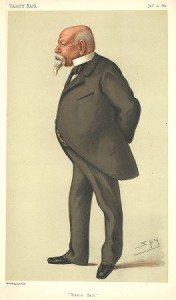
"Sam Ward's mission in Washington was to soothe the nerves and livers of unapproachable men." (Image by "Vanity Fair.")
Even those who hate Washington lobbyists probably would have liked Samuel Cutler Ward, a writer and gourmand who used his highly evolved social skills to become known in our nation’s capital as “King of the Lobby.” Ward was actually lauded during his career for using his talent for entertaining to sway votes rather than employing the time-tested method of the bribe. The New York Times provided a lengthy, admiring obituary when Ward died on May 19, 1884, and the Brooklyn Daily Eagle recalled him fondly as well. An excerpt from the Eagle’s clunky piece:
“One of the unique figures on our social stage, perhaps the most widely known and favorably regarded of Americans abroad, passed out of existence when, on Sunday Mr. Samuel Ward, universally known as Sam Ward, died in Italy. The cablegram that announced his death contained the news that he died peacefully, surrounded by friends, very much as he had lived. It is not probable that he had any enemies to speak of, for the true disciple of Epicurus has neither taste nor talent for quarreling. Yet, though he will not be missed as a man more potent in affairs would be lamented, the very fact that this amiable apostle of ease and enjoyment, of indeed a sort of supplementary evangel of sweetness and light as expressed in the important matter of refining the grosser palates and manners of his neighbors, he discharged with a great deal of comfort to himself a really important duty. He went through life seeking by intellignt inquiry into obscure conditions to mitigate its acerbities to the utmost. Bland, clever, cheerful, with a cultivated literary taste and the perfection of good manners, he made everybody comfortable with whom he came into contact, himself perhaps the most heartily satisfied of them all.
In political life his peculiar talents were turned to unexpected account. The recalcitrance of the Philistine is much more largely due to the protest of his physical organism against the outrage of his diet than is generally suspected. Sam Ward’s mission in Washington was to soothe the nerves and livers of unapproachable men in his own inimitable way. It was by a due proportion of good stories and the finest wines, of a perfect adjustment of edibles and drinkables, with sallies of neat Horatian wit, that he charmed his guests into a proper condition to listen to his arguments.”
Tags: Samuel Cutler Ward











